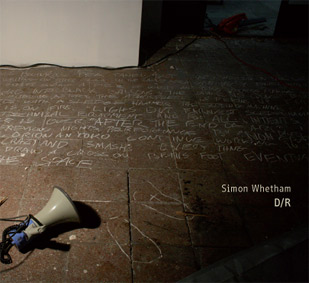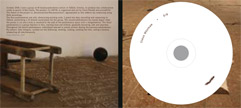

SIMON WHETHAM
D/R
CDR, (47:30 min), 100 copies, digipak cover
© 2009 / 1000füssler 013, Release Date: August 2009
7,00 EUR (include shipping)
reduced price, cause the last covers have some tiny traces. (only few copies left!)
October 2008, I join a group of UK based performance artists in Tallinn, Estonia, to produce new collaborative works as guests of Non Grata. The project, Co-LAB‘08, is organised and run by Orion Maxted and protopPLAY. The theme of the project is ‚Deconstruction/Reconstruction‘, appropriate as this reflects my composing using field recordings.
The first performances are solo, showcasing existing work. I spend two days recording and composing in Tallinn, performing a 30 minute sound piece for the group.
The second performance has barely begun when the power is cut and a hole is smashed in the wall of the performance space with a sledgehammer.
The third performance is a group reaction to this, starting loud and intense, gradually becoming calm and peaceful.
Throughout the fourth performance, individuals reacted to artists actions during the previous performance. My subject, Yoko Ishiguro, carried out the following: smoking, cooking, washing her hair, eating a banana, attempting all simultaneously. (Simon Whetham, 2009)
Installation images from Co-LAB‘08 project 2008. Photographs: Tanel Saar
web.mac.com/ishiguroyoko | www.nongrata.ee | www.protoplay.net
Tracklist:
Tallinn 27‘37
Decrescendo 12‘34
Yoko 7‘20, mp3 excerpt

About the Artist:
Simon Whetham, from Bristol, UK, composes new sound environments through phonography: the evocative art of using field recordings of natural sounds. Hearing, and then capturing the music in everyday noises, Simon draws the listener‘s attention to the subtle details and sound layers commonly disregarded.
Simon has both performed extensively and had his work presented in many galleries in the UK and in Europe. His sound compositions have been released through a number of specialist record labels, such as Lens Records, Con-V, with forthcoming releases from And/OAR, Mystery Sea.
„In my work I attempt to bring the listener’s attention to sounds not normally noticed. It is easy to miss, or dismiss, beautiful and strange sounds that constantly surround us - dripping melt water on a wooden porch, the whistle of wind through grass, the crack of thawing ice, the whirr of a cable car.
The eye being the primary receptor of information is a concept I work against. A sound without a visual context becomes an abstract, often unidentifiable entity, leading one to reconsider the importance of sound in an environment.“
www.simonwhetham.co.uk
REVIEWS:
The Watchful Ear / UK
The liner notes to this disc include the following description of the circumstances around the recording of this music: [...]
Interesting, if not all that clear stuff. How any of this translates itself into the music we hear on the disc is equally uncertain, but it seems as if we get the first, third and fourth performances mentioned in the text on the CD. The second was presumably just too short to be worth recording and presenting, and once the power was cut there was no way of recording what happened. (But who cut the power before wreaking havoc on the walls anyway? Was this planned? Part of an artwork? or just someone that didn’t appreciate the music?
The first piece, just named Talinn, lasts near enough half an hour, and consists of a series of passages of grainy textures, sometimes looping obviously, often not, that generally tend to rise slightly in volume over a twenty second or so duration, sometimes evolving slowly into something else, sometimes cutting dead, or replaced by something louder suddenly arriving. Although many of the sounds are not that unusual in the kind of music I listen to (vaguely industrial hums, gritty friction, rattling surfaces etc) their placement within this curious structure is interesting. There is no tendency towards a big conglomeration of sounds, no clever juxtaposition of different sounds, just this strangely patient, oddly shaped half hour of sounds that were collected from around the Talinn area.
The second track is something quite different again though, and much more interesting again. The twelve and a half minute piece begins very loudly indeed, with a cacophony of what sounds like multiple layered snippets of dramatic symphonic music, all piled on top of each other thick and fast to create a mass of vaguely familiar yet completely indecipherable sound. This continues for several minutes, only to gradually decrease in volume half the way through the tracks duration, a few distant bangs and scratches slowly dissolving into a very very quiet series of hums and whispers for the final closing minutes. The complete contrast between the riotous grandeur of the track’s opening and the virtual disappearance of all sound later in the piece is really quite jarring. I found myself checking the CD player to be sure an extra track had not clicked over. The track, not surprisingly titled Decrescendo is a really curious one, that I actually replayed several times midway through my first listen through the album, something I don’t often do.
The seven minute long final track is called Yoko, and presumably is the piece formed from recordings of Yoko Ishiguro’s actions as outlined in the liner text. We hear dribbling water, presumably from the washing of hair, a ticking clock, distant crashes of metal, deep claustrophobic breaths (which don’t sound female, sorry if they are!) clicking, hissing, and again everything gradually disappears into virtually nothing. This piece does not sound much like music as such, more a collection of incidental sounds, a bit like when someone phones you from a mobile phone without meaning to, and you hear the inside of their pocket for a while. The the sounds are all quite clearly recorded though, the piece is certainly no accident, and there is enough dynamic arrangement to be sure that it is a composed piece.
These last two tracks are easily the best I have heard yet from Simon Whetham. They are both quite original and unusual, very different to what I have heard from him before. D/R confuses me as much as it intrigues and delights in places, and that is a good thing. Musique Concrete always works better for me when I am surprised by sounds and structures, when I find myself wondering what on earth I am listening to and how it all fits together. Nice stuff. I wonder if I put a sledgehammer through the wall between tracks one and two would it become even more authentic?!
Richard Pinnell / The Watchful Ear, October 30, 2009
Vital Weekly / Netherlands
On CDR we find the work of Simon Whetham, by now perhaps no longer an unknown guy. He has had a couple of releases on Trente Oiseaux, Entr'acte, Gruenrekorder and his work deals mainly with field recordings. In October 2008 he went to Tallin, Estonia to work on a project with a performance group on the theme of 'Deconstruction/Reconstruction'. One piece wasn't documented, the other three are. The first piece is deals with the city sounds of Tallinn, which are processed (I think) into some collage form. The typical work of a modern day composer of city sounds, I'd say, but Whetham does a fine job at that. Its a very playful piece, detailed and rich. In 'Decrescendo' things move from the loud to the soft, as implied by the title. Starting out with classical music, which, once died out, fades into sparse metallic sounds that scratch the surface and some deep bass rumble. Almost silent in approach. Perhaps the best piece of the three. [...]
Frans de Ward / Vital Weekly 698
Bad Alchemy / Germany
Der Titel steht für Deconstruction / Reconstruction, Thema des Projekts Co-LAB‘08 bei einem von Academia Non Grata organisierten Meeting in Tallinn. Beim ersten und mit 27:37 zentralen Stück ‚Tallinn‘ entsteht der leicht klaustrophobe Eindruck von Tiefe und Außendruck. Etwas Höhlenhaftes. Als wäre man als Leutnant Werner die erste Nacht auf der U 96 und das metallische Rumoren noch ungewohnt. In diese Phantasie schleichen sich Traumbilder von ‚Draußen‘, Grillengezirp, das aber ebenfalls etwas nähmaschinenhaft Motorisches. Dongendes Klopfen, helles Knispeln, Gebrumm, ein Harmonikasummen, als würde man sich sein eigenes Einschlaflied träumen. ‚Decrescendo‘ setzt danach mit einem rummsenden Orchestertutti ein, das allmählich in Beinahestille wegtaucht. ‚Yoko‘ ist, wenn ich das recht verstehe, eine Reaktion auf eine Performance von Yoko Ishiguro. Es besteht aus klappernden Geräuschen, gelegentlich metallischen Schlägen, Atemzügen, Wassergeplätscher, zunehmend verdichtet und in Korrespondenz mit Ishiguros Versuch, gleichzeitig zu Rauchen, sich die Haare zu waschen und eine Banane zu essen. [...]
Rigo Dittmann / Bad Alchemy 64
back to: 1000fuessler